
About two-thirds of companies find it tough to produce engaging content. If you’re one of them, there’s a good chance your problems stem from the ideation phase. In other words, you’re struggling to come up with enough engaging blog post ideas.
Now, if you’re a regular visitor to my blog, you’ll know I write a lot of content (also, thanks for reading!). I’ve been doing this for a long time now. But I still sometimes struggle to come up with new blog post ideas.
So what do I do when writer’s block strikes?
Well, I lean on the tried-and-trusted methodologies I’ve built up over the years for devising new content titles.
Of those methodologies, one of the most consistently useful is to raid YouTube for blog post ideas. I’m going to tell you exactly how to do it in this article.
Why Should You Use YouTube for Inspiration?
It might seem counterintuitive to use a streaming video site to find blog post ideas. Wouldn’t it make more sense just to look at other blogs?
Sure, that can be a super effective tactic, too, but you can’t learn everything from reading your competitors’ blogs. If you keep relying on the same old sources to find content inspiration, you’ll inevitably keep producing the same sort of content, time and again.
If you want to keep pushing the boundaries and creating fantastic content that makes a real impact, you need to cast the net wider. Here are a few reasons why YouTube can help you do that.
It’s Easier to Differentiate Yourself
When you use other blogs to inspire your blog post ideas, you might find yourself wondering: “How can I do this better?”
Sometimes, you’ll be lucky. You’ll stumble across a super engaging title, but the actual article will be poor quality. Maybe it’s several years old and the information hasn’t been updated. Or perhaps it only scratches the topic’s surface, rather than going in-depth.
Other times, there’s no obvious way to improve on the original. But because you’re so convinced it’s a great blog post idea, you end up effectively rewriting your competitor’s article and adding a ton of extra information that doesn’t add any real value. Congratulations, you’ve written a worse post than your rival!
This is far less of a problem when you use YouTube to find new ideas. Why? Because with a lot of videos, there simply won’t be a decent written version available. There might be a transcript of the video, but nothing that’s been created with readability in mind.
That makes it much easier for you to go out and create something better.
There’s So Much Content to Draw Inspiration From
An astonishing 500 hours of content gets uploaded to YouTube every minute, and that number is growing every year:
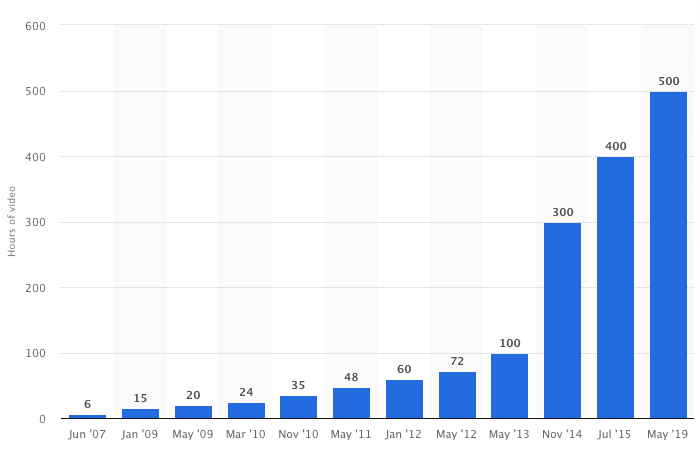
To put that into context, the major six movie studios released 87 pictures in 2019, at an average length of just over 96 minutes. That means it takes YouTubers around 16 seconds to upload the equivalent of an entire year’s worth of Hollywood content!
With such a wealth of content available, even super niche businesses are pretty much guaranteed to find something relevant to inspire them. And you don’t even need to navigate multiple platforms to find it.
People Interact With Videos & Blogs in Completely Different Ways
This is a subtle point, but an interesting one. Say you find a YouTube title that sounds like a perfect blog post idea, but it has not generated many views or engagement. Well, that’s not necessarily a problem.
Why? Because people engage with different content types in different ways.
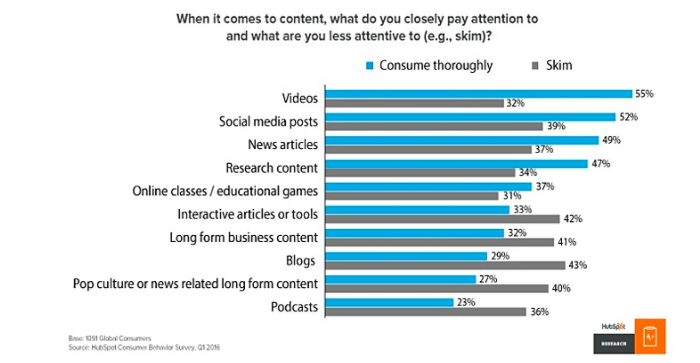
As this HubSpot graphic shows us, people prefer to thoroughly consume videos rather than skim through them to find the information they’re looking for. That makes sense; videos are designed for watching from start to finish. There’s often no easy way to jump to a specific section.
Blogs are different. Only 29 percent of people read them from top to bottom, with 43 percent preferring to skip through. That’s because blogs are fantastic for skimming. Subheadings, bullet points, numbered lists, tables, and various visual elements make it simple to find the most relevant information.
So what does this tell us?
A piece of content could perform poorly on YouTube because it’s just not a good topic for a video. Yet it could still make for a fantastic blog post. So you don’t necessarily need to worry about how many views a video has racked up; you can just focus on finding good titles.
4 Ways to Find Blog Post Ideas From YouTube
YouTube is a gold mine of potential blog post ideas! Now here are four ways to find them.
1. Stalk Your Competition
If your competitors are on YouTube, they’ll have done a lot of the hard work for you. Chances are their content will be highly relevant to your audience, too. Go check it out, pick the best titles, and turn them into high-quality blog posts.
Start by drawing up a list of your competitors. Not sure who they are? Try the following:
- Speak to your sales team: They’re the people selling your product, so they’ll know which companies they come up against regularly during the sales process.
- Ask your customers: They likely considered a couple of different products before purchasing yours, so find out which other options they evaluated.
- Do some social listening: Your audience might use forums and social platforms to seek out advice about your product and compare it to your competitors, so go find those conversations! Not sure how? Check out this article on my four favorite social listening tools.
Now you’ve got your competitor list, simply visit their YouTube channels and browse their existing content. In the “Videos” tab, you can use the drop-down “Sort By” menu to segment their content by:
- Most popular
- Oldest
- Newest
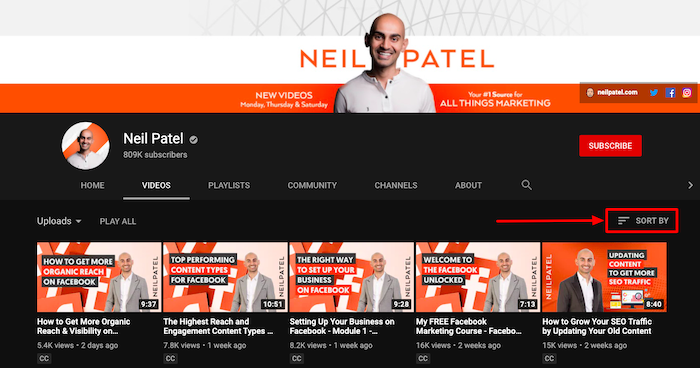
So let’s imagine I’m one of your competitors. Checking out my most popular videos feels like a good place to start.
Straight away, you’ll see a bunch of titles that you know have resonated with my audience. Most, if not all, of those titles could also be written up as blog posts, like:
- SEO for Beginners: 3 Powerful SEO Tips to Rank #1 on Google in 2020
- How to Promote Your YouTube Video When You Have ZERO Subscribers
- How to Create a Digital Product That Generates (AT LEAST) $100,000 Per Month
- How to Write a Blog Post From Start to Finish
- 1 Simple Hack to Getting 1,000 Likes on Facebook
You don’t even need to watch the videos (although you should, they’re great). Take the titles, switch them up, do your research on the topic, then turn them into new blogs.
2. Read the Comments
YouTube comments get a bad rap, but they can be a surprisingly rich source of content inspiration. Commenters are rarely short of advice on how videos could be improved or expanded, and those suggestions can help you formulate new blog post ideas.
Again, let’s use my YouTube channel as an example. Currently, this is my most-viewed video:
As well as clocking up more than 1.7 million views, it has received thousands of comments. A lot of those comments are essentially just people telling me they like the video, which is always nice to hear but not super helpful for finding new blog titles. But some of them give me (and my competitors, if they’re paying attention) a useful steer on future content ideas. Here’s a good example:

Wendy wants to know how I use keyword information from Google Search Console to optimize my content.
As you can see, I’ve already left a short response. But I could go further and create a whole blog post explaining how to use Google Search Console to improve your existing content and create new articles.
Here’s another useful comment on that same video:
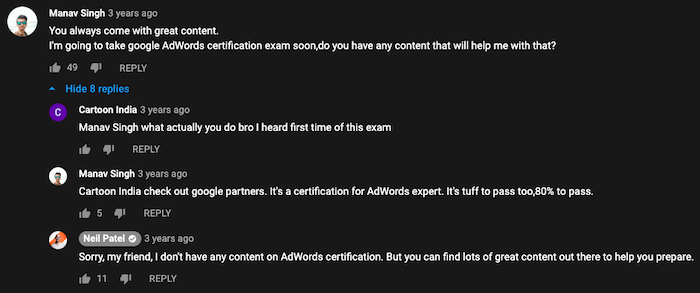
Manav asks me if I have any content on Google AdWords certifications. As it happens, this isn’t something I cover, but it could make an excellent blog post idea for some of my competitors.
3. Take Advantage of Predictive Search
You probably think of YouTube as a video-sharing platform, but it’s also a search engine. In fact, it’s the second-largest search engine in the world.
With over two billion logged-in users visiting YouTube every month and watching more than a billion hours of content a day, the platform generates a ton of search activity. Thanks to its built-in predictive search functionality, you can use all that activity to track down potential blog post ideas.
This is a really simple process. Just enter a topic into the search box, and you’ll see a bunch of predicted searches:
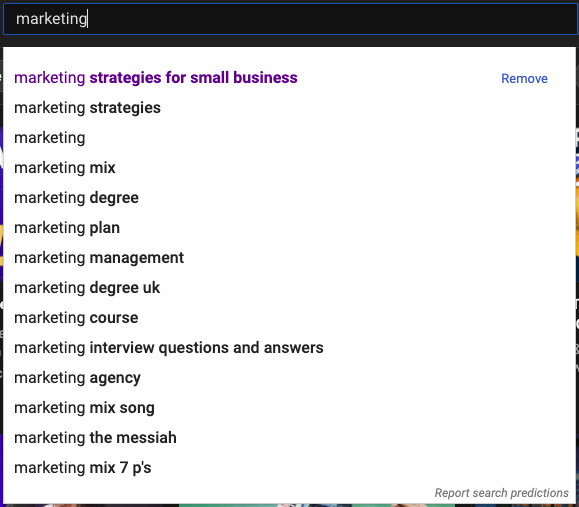
Now, it’s a case of exploring the options that sound most relevant. “Marketing degree UK” probably isn’t right for me, but I like the sound of “marketing strategies for small business,” so I’ll take a closer look.
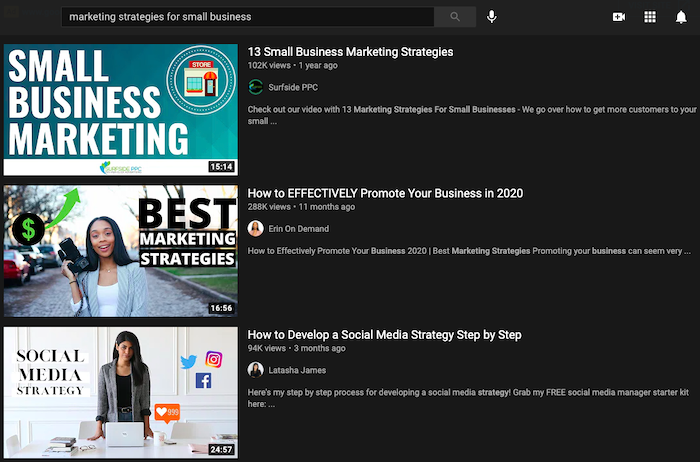
Just from viewing this tiny subsection of results, it seems that “how-to” content resonates with people looking for small business marketing strategies. So do listicles. In other words, we’re not only getting insight on blog post ideas; we’re also learning how our blogs should be structured.
But there’s more. Scroll down the page, and you’ll find a section on related searches:

Each one of those could potentially give me a bunch of additional titles and reveal yet more related searches. The deeper you vanish into the rabbit hole, the more blog post ideas you’ll find!
4. See What’s Trending
It’s important to remember that there’s a whole world of content outside your specific niche. What’s going on out there will naturally affect you and your audience, so it might make sense to write about it.
But what if you don’t know what everyone’s searching for?
Fortunately, YouTube can help here, too. Just visit the “Trending” tab in the left-hand homepage menu to find the content YouTube deems to be most relevant and topical:
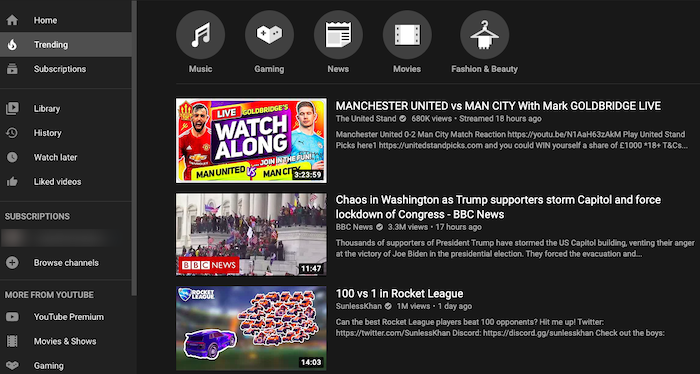
Sure, not all of it will be relevant to your audience or brand. Chances are, most of it won’t be. However, I make sure to check in with the Trending section at least once a day to be sure I don’t miss any opportunities to piggyback on viral topics.
Conclusion
Once you start thinking of YouTube as a search engine rather than a video platform, its role in finding new blog post ideas makes a lot more sense.
Just like Google, it’s effectively a huge directory of content on every subject you could ever imagine. But unlike Google, the vast majority of that content exists to engage audiences; the search results aren’t crammed full of product descriptions and category pages. That’s why it’s such a treasure trove for marketers seeking the inspiration they need to create superb content.
What tactics do you use to come up with new blog post ideas?
The post How to Get Blog Post Ideas From YouTube appeared first on Neil Patel.


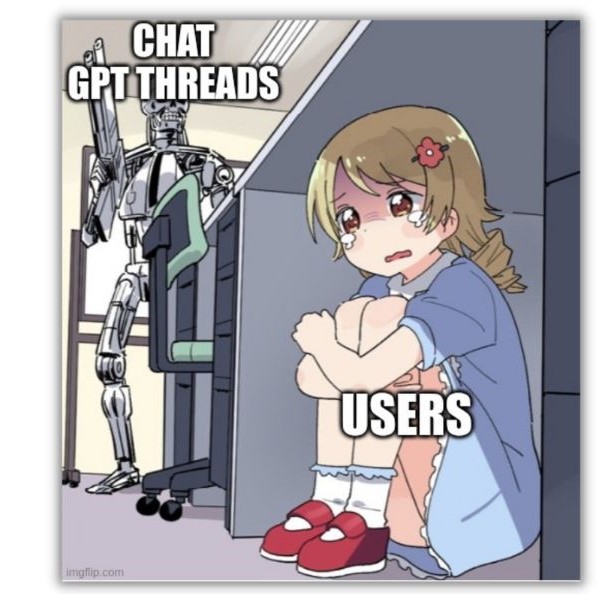

Recent Comments